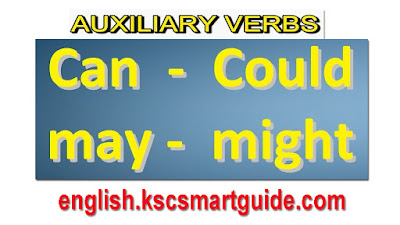Auxiliary Verbs "Can/Could" and "May/Might/Must"
- Can. Can – for ability. I can dance Tango. ...
- Could. Could – past ability. I could run ten kilometers when I was younger. ...
- May. May – for formal permission. May I come in? ...
- Might. Might – for possibility. The electrician might be finished by tomorrow. ...
- Must. Must – to express a formal request or necessity.
Read More:
Infinitives Part 1- English Grammar Topics
Comparative and Superlative Adjectives
Advanced English Grammar with Answers Book
Can
Used to express ability (to be able to do something):
- I can make jewelry.
- He can’t speak French.
- Can you open this jar?
Used to ask for permission:
- Can I use your bathroom?
- Can I leave now?
- Can I raise the volume?
Used to make requests or suggestions:
- Can I have more napkins?
- Can I have the bill?
- You can take this spot if you like.
- You can do whatever you want.
Could (past form of can)
Describes an ability that someone had in the past:
- I could swim when I was young.
- You could see the boat sinking.
- They could tell he was nervous.
Often used in auxiliary functions to express permission politely:
- Could I take this jacket with me?
- You could borrow my umbrella.
- Could you please let me pass you?
- Could I get you more water?
Used to express possibility:
- All of them could ride in the van.
- You could always stay at our house.
- Could it be true?
- This plan could really work out.
Read Also: Latest English WhatsApp Group Links
May
Used to ask for formal permission:
- May I come in?
- May I say something now?
- May I ask one question?
Used to suggest something that is possible:
- She may agree with this plan.
- They may not be happy about what happened.
- It may shower tonight.
Might (past form of may)
Used to suggest a smaller possibility than may does (actually, might is more common than may in American English):
- He might have finished it.
- I might go see a doctor.
- I might not come this time.
- It might be right.
- You might have lost it.
- The store might have been closed today.
Click Here to Active Voice and Passive Voice Quiz
Must
Used to express something formally required or necessary:
- I must complete the project by this week.
- The government must provide health care for everybody.
- Everyone must save the natural resources of the earth.
- The building must have a fire alarm.
- You must answer my question right now.
Used to show that something is very likely:
- He must be a genius.
- You must be joking!
- There must be an accident.
- She must be very tired.
Read Also: SPMU NHM AP Recruitment 2020

 K.S.Chowdary
K.S.Chowdary






%20-%20English%20Speaking%20Basics.jpg)
%20-%20English%20Speaking%20Basics%20-%20Part%20III.jpg)

